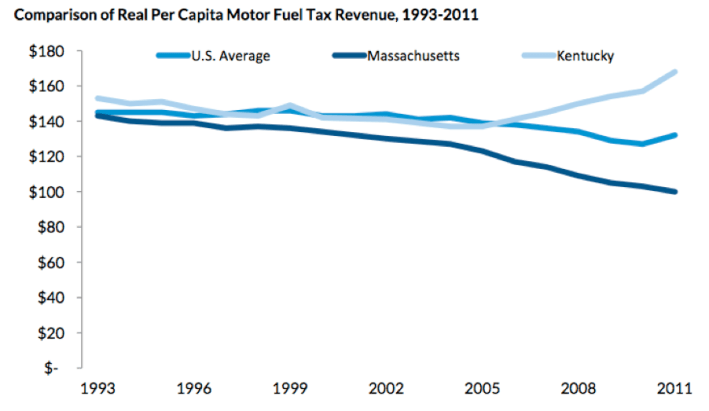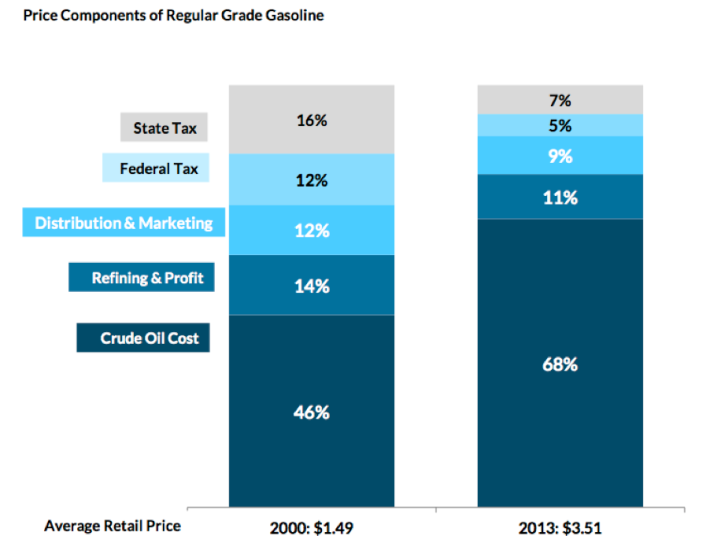
Amid all the hand-wringing in Congress about transportation funding is one simple fact: The federal gas tax has been unchanged at 18.4 cents per gallon for 21 years. During that time, rising fuel efficiency and inflation have chipped away at how much the tax brings in and eroded the value of what remains.
To make up for the federal paralysis, states have increased revenues on their own. Since 1993, 42 states and the District of Columbia have raised gas taxes.
That shows real courage on the part of state and local lawmakers -- a courage that’s been conspicuously absent on Capitol Hill. And that courage has been vindicated: Even where voters have beaten back attempts to raise the gas tax -- most recently in Massachusetts, where an Election Day ballot measure repealed the state’s new practice of automatically indexing the gas tax to inflation -- they haven’t punished lawmakers who voted for them.
Still, only half of the states that raised the gas tax have done so by more than 5 cents a gallon. And the vote in Massachusetts could have a chilling effect on other states that would like enact a mechanism to keep the gas tax in line with costs without having to take frequent, politically difficult votes to raise the rate.
In a report released just after Election Day, Richard Auxier of the Tax Policy Center -- a joint project of the Brookings Institution and the Urban Institute -- makes the case for state-level gas tax reform.
Making the gas tax a simple sales tax seemed like an appealing option when gas prices were rising steadily, but over the past few months it’s seemed like a less wise choice. Still, over time, it would have made a big difference: Combined federal and state gas taxes have dropped from 28 percent of the total cost of gas in 2000 to just 12 percent in 2013 as the price of gas jumped 136 percent.

While most states’ attempts to address the problem of declining revenues have been too timid to make a significant difference -- and three states have actually voted to decrease their gas taxes -- a few states have found innovative ways of dealing with the problem.
Before the electoral defeat, Massachusetts was onto something when it decided to automatically adjust the gas tax for inflation. “If the Massachusetts gas tax rate had been indexed to inflation from 1993 to 2013, and gas consumption did not change, the state’s gas tax revenue in 2013 could have been more than 60 percent higher,” Auxier wrote. That’s the difference between the $569 million it took in and the $932 million the state could have had. And that’s during a period of low inflation.
Massachusetts might be back at square one, but Maryland’s inflation-adjusted rates, also approved last year, still stand. And Florida has tied a small part of its tax to inflation since 1990.
Meanwhile, Kentucky ties its gas tax rate to the average wholesale price of gasoline. Though there’s no guarantee that gas prices will climb forever, this method has led Kentucky’s gas tax to rise from 12 cents per gallon in 1993 to 30.8 cents in 2014.
North Carolina has both a 17.5 cents-per-gallon excise tax and a tax that’s tied to wholesale gas prices. The result: North Carolina’s total gas tax rate rose from 22 cents per gallon in 1993 to 37 cents in 2014.
Pennsylvania recently went from a system like North Carolina’s to a single tax tied to wholesale gas prices.
Nebraska, unlike any other state, ties one small part of its gas tax to the state’s transportation spending. (The other two parts of the tax are a flat 10.3 cents-per-gallon excise tax and one tied to gas prices.) While making an explicit connection between the tax and what it’s supposed to pay for is a big step toward ensuring adequate revenues, Auxier notes that Nebraska’s doesn’t go far enough. “The third component is small (currently 1.9 cents per gallon), and the legislature is careful not to approve transportation spending that could trigger a large rate increase,” Auxier wrote. “As a result, Nebraska’s 27.3 cents per-gallon tax rate is only 2.7 cents higher than it was in 1993.”
Oregon -- the first state to enact a gas tax -- is the first to try to wriggle out of its confines, too. Oregon is testing out a program that would replace gas taxes with a miles-traveled fee, at least for high-efficiency cars. California’s legislature also just created a VMT tax pilot program last month.
Wyoming’s gas tax last year hike didn’t mess around with indexing or gas prices or VMT, but the state gave the excise tax a hefty lift, from 14 cents to 24 cents.
Meanwhile, a couple of states are going in the wrong direction. Virginia “significantly reduced the link between transportation taxes and transportation funding” with last year’s transportation package, in which the state lowered its 17.5-cent excise tax to 3.5 cents and increased general sales taxes, shifting the burden of road costs to the general population. A failed ballot measure in Missouri this summer would have had similar consequences.





